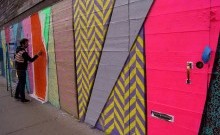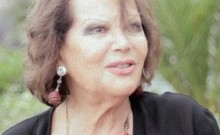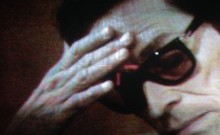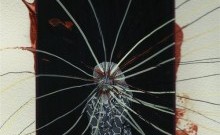History Rewritten
Laced with an outrage & an outrageous sense of humour, never ruling out any of the various fits of hysteria that might possess his characters, Shaka King has managed in short order (his first feature, Newlyweeds premiered at Sundance 2012) to establish himself as a director with an aesthetic vision as clear as it is nearly inexplicable, intertwining the everyday struggles of Black Life with a taste for the absurd. Three years later, King returned to Sundance with the short film Mulignans, released online shortly after, & easily the most original, excoriating indictment of racism that could be found snuck into a Brooklyn Brownstone - stoop - set satire --- not to mention the funniest thing we've seen this year (Note: Mulignans will cause uncontrollable laughter if you can get in on the joke). I caught up with Shaka, who I hadn't seen since Park City in 2012, from LA, where he was busy trying to get a new project underway.

EVAN LOUISON: I wanted to give you the opportunity to talk about the background of the short. I know you’ve discussed it elsewhere, but what I’m really struck by & interested in is whether or not the germ of the idea is something formed from your experience growing up, & how much people’s voices you were around when you were younger informed it. I know you went to school in Bay Ridge. A lot of the satire in the piece is accomplished by lyrical, gestural things in the perfomances, & a lot of it with expression & mannerisms --- but so much more is present for the audience in the voice. The voice is a lot more specific of a reference for people who don’t know Italian Americans from Brooklyn. You’re clearly referencing a very specific person, or type of person.
SHAKA KING: Well you know, growing up & spending a significant amount of time, from 5th to 12th grade, in Bay Ridge, that kind of coincided with my developing an interest in movies. Especially those 90s Scorcese movies, Goodfellas, Casino...I remember watching Goodfellas with my mom on tape, & then going with her & my aunt to see Casino in theatres...those mobsters and mobster wannabes, they’ve always been hilarious to me. They’re just the funniest…great storytellers, largely a product of coming from a sort of oral-storytelling tradition. But it’s also very valuable in that culture, like a lot of city cultures, to be quick-witted & have the gift of gab. And those guys all have the gift of gab. As ignorant as they are, listen to them: they’re mad smart. You know what I mean?
EL: Sharp.
SK: Super sharp, mad observant. I always found those cats entertaining, fascinating. Just as a voyeur, as an outsider. So when we set out to satirize the negative aspects of their culture--- misogyny, racism ---it was also important to showcase how fucking hilarious they are too.
EL: It’s a problem cause you want to not laugh, in real life too, with certain people. They come up with the most horrible things to say but they are really brilliant turns of phrase sometimes, & can’t help but elicit some reaction.
SK: I could never help but laugh. I said this to people before: one of the funniest moments in a movie ever for me is when Joe Pesci in the voiceover in Casino calls Arabs sandniggers --- & it was the first time I’d ever heard that expression --- & I thought it was just the funniest fucking thing I’d ever heard. And it was insulting to me, by nigger --- he means me. But it was still hysterical. That’s the truth with most horrible things: that there is always a layer of humour to it, ‘cause tragedy is absurd.
Stills from Newlyweeds, 2013 ©Phase 4 Films
EL: There’s a certain absurdity to the exaggerated postures that isn’t that out of place considering the other stuff you’ve done. It’s in the air in a lot of these scenarios you’ve created. Each of them are like a trip in a certain way --- there’s always this absurd, upside-down feeling to everything --- the short seems to be a continuation of this, where you’ve literally flipped the idea on its head. Like in Bamboozled, the reality upside-down has the ability to appear more clearly ridiculous & upsetting than in its normal state. There’s a strong, tried & true paradigm of showing racism in Italian-Americans in cinema, to the point where it’s almost old news. But when you put it in a different context, it shows just how disgusting it is in a completely new way.
SK: I was curious, because I didn’t know what it would show. It was really an experiment. From the audience’s reaction, most people found the short funny. But this is from what I know. Nobody’s gonna tell me they found it offensive. I did have a friend who programmed it at a film festival say, “Oh, no --- people definitely did find it offensive, they just don’t tell you that.” And that’s good. It was definitely our intention, to offend. We wanted to have that two-pronged effect that those types of movies have for me as a Black Man, watching say, Taxi Driver --- & I mention Taxi Driver because it’s one of my favorite movies, it’s one of the most important movies for me --- & then seeing the scene where Scorcese says to Travis in the backseat of the cab, where he says “You know who lives there? A nigger lives there,” it totally fucks the movie up for me.
EL: There’s a lot of racism in the subtext of those characters, under the surface & not.
SK: But in those other parts, even though it’s under the surface, those parts don’t feel like a racial assault, whereas that scene does feel like a racial assault.
EL: Where does that ethereal touch come from that appears in your work? You create these worlds that could easily invoke a sense of being caught in the middle of a dream, or at very least an alternate hyper-reality. Everything you’ve done has this stilted, encapsulated air to it.
SK: I think that’s just my taste, from a very young age, I’ve been drawn to making things that way. I remember the first stuff I was writing, the first short story I ever wrote, it was about me & my friend Ayende at his house up in Harlem, & I didn’t even smoke weed back then, but in the story a bunch of us are in a cypher smoking blunts and one of our friends reveals that he’s Death, & proceeds to kill another one of our friends whose time is up. It starts in a world that’s real, & then goes into this very surreal place. But it never gets too surreal. I wrote it from the position of the narrator, in my own voice, you know, “My boy was Death, he would take all these souls...”, using slang, using my own voice. From a very young age, that has always been my aesthetic --- introducing as much as I can of a hyper-authentic place, & then subverting that, flipping it completely around.
EL: It’s unsettling.
SK: That’s good.
Mulignans, 2015.
Produced and Directed by Shaka King
Written by Shaka King and Kristan Sprague
Director of Photography Daniel Patterson
Editor Kristan Sprague
EL: It’s comforting in a way because it’s beautiful --- the artifice of it is beautiful, the execution is always very composed, painterly --- but you often experience this strange world where all of this can happen, & yet forgive the fantasy, the hyper-reality, & accept it, from the first note of the picture. In the first scene, first shot of Newlyweeds, the character of Lyle says to Nina: “I don’t dream. That’s why I burn,” & she says back to him, “Nah, that’s why you can’t remember your dreams.” It’s like something about that difference, that part of a person’s life, where their subconscious or their fantasies collide with their reality, that seems really important to your work. You could almost be an observer to the character’s dreamscape through watching the picture.
SK: The dreamscape is a place I’m constantly trying to get in touch with, for myself. I don’t know where I get ideas from. Anything I actually like, it’s hard to remember how I got there.
EL: There’s definitely an emphasis on issues of class as well, & the racial component of the class disparities in turn. Is that conflict something that unsettles you & you have to create a response to it, a comedic environment for it to exist in, in order to work it out?
SK: I haven’t really thought about it too much. It’s definitely present in Newlyweeds, & that was an important aspect of that movie. I wanted to do something with two Black people, a man who didn’t have an extensive formal education, didn’t come from money, & a woman who did. Setting it in Bed-Stuy, that’s the reality there, having spent my whole life living there, being from there, I can attest to that ---
EL: House to house it’s different.
SK: Yeah, it was always a neighborhood where there are people doing well for themselves, & people who are not doing so well for themselves, co-existing on the same block, & they’re all Black. I was just curious because I felt like it was shocking that I had never seen that shown in a movie, even in the background. And that surprised me, cause that was something I’d witnessed my whole life. When I sit down to create any story, generally speaking I start from the characters. I develop the characters based on their psychology, their physiology, & their sociology. So of course, class is always something I’m aware of. Then when I’m creating the piece, that stuff is going to work its way in there organically, cause it’s built from that place. I feel like most movies you watch, they’re about people who, for them, that doesn’t matter. They have all the money they need. Their fridge is always just magically stocked. You don’t even see them spend money. It’s a totally different reality.
EL: It’s like an antiquated relic left over from when they were working with the first few plots...
SK: (laughter)
EL: ...Nobody’s asking “wait, how does that girl live in that apartment? She’s the cigarette girl!”
SK: (laughter)
EL: Probably never came up in the writer’s room...
SK: There are plenty of movies that are about that, but when you create an entire world, all these little, tiny things about a person’s life make an appearance. Like the fact that this one has money, this one doesn’t. That’s gonna come up in a subtle way, just like it does in life. So many things that happen to us in the course of the day don’t mean anything. They’re not about anything. I feel like that’s how I try to treat these things.
EL: There’s also some repeated theme of a father’s perspective of his daughter in a lot of your stuff, in Newlyweeds the father is protective of Nina, & then condescends to Lyle towards the end, trying to relate to him. In Mulignans, your character threatens his sister when he sees her talking to a white guy, “You’re lucky I don’t tell Pop!” It’s one of the more incendiary lines in the piece, & then later when you reveal the father, his expression, it becomes clear this is an dynamic of particular concern, but I’m not sure if it’s conscious on your part or not.
SK: I know why we added that line. I’m not that aware of any throughline per se, but in those films about Italian - Americans, that relationship axis of the father-daughter-son structure, that was something we wanted to specifically point to.
EL: The view of the daughter, & the idea of the daughter with another man.
SK: I don’t have daughters or sisters, so I’m not sure...
EL: Is that something you’ve encoutered?
SK: Probably. Chiz [actor Anthony Chisolm] in Newlyweeds, he improvised that character & brought that character element of trying to empathize with Lyle. It worked because I could all of a sudden see that his character, when he was young, was the same as Lyle. And it was so funny to realize that his intervention in Nina’s life came from that awareness, that “this was me.” When he finds the bag of weed in their room he says, “I’ll just take this off your hands...” [laughter] I didn’t take it to be condescending as much as legitimately saying to Lyle, “Dude, you’re a mess. I’m not trying to have my daughter become a mess...Get your shit together!” That’s totally legit for a father to say.
EL: You don’t realize it’s a conscious thought in your mind until you see something in another person that reminds you of yourself, of what you might appear to your partner’s father.
SK: I’ve been super fortunate in that way.
EL: You’re involved in the BlackOUT campaign. Seemingly innocuous choices, as well as some fairly questionable judgement calls lead to pretty tragic consequences a great deal in Newlyweeds, as well as your short Herkimer Dufreyne. This might be a broad circle here, but I’m gonna attempt to draw a connection here: In the aftermath of Eric Garner’s case in NY, the situation in Ferguson, elsewhere in the country, a lot of people have had their awareness levels raised across the course of the last year, year & a half or so, as to an added perspective of what a lot of Americans’ experience is as opposed to their own. How much is life in America governed by these moments, ones that might seem inconsequential were they not to turn to tragedy? On the surface we’ve seen behavior that might be categorized more correctly as innocent, or at very least, harmless, but depending on who you are & what color you are, the iron gavel of fate or chance seems to pack a pretty heavy swing.
SK: Being able to fuck up is really a luxury. In Newlyweeds, Lyle doesn’t have a lot of room for error. He doesn’t have a lot of people, let alone a system, looking out for him. And that’s how it is for a lot of folks in this country, particularly non-White people. There is little room for error. When I was a kid, & this is tangential, but I didn’t smoke weed until college. I had friends who did it from when we were 12 years old, but quite frankly, many suffered as a result. Something as innocuous as smoking a blunt intro’d them to the criminal justice system. Years later they’re “recidivists” and the worst thing they’ve ever done is gotten high on a park bench. Meanwhile I go to college & I’m around these rich white kids, who are getting high 24/7 and interning at Goldman Sachs. There’s no penalties for them. Even for me now…I might have made a movie, I might have all these things on the horizon, no doubt --- guess what? They will kill me out here and rewrite my whole history. Any time the cops shoot a Black Man, it’s always revealed that he wrote curse words on his Facebook page & smoked a blunt once, & that makes him a felon. Meanwhile these characters on Workaholics, Girls, Broad City, they can go to work smelling like weed, & it’s endearing.
EL: Black Life is for some reason really frightening to a significant quotient of the population, even to this day. It’s not so much a whitewashing as hermetically sealed, centric divisions, cordoning off people from different families & cultures. There’s nothing threatening about someone selling cigarettes on the street, there’s nothing threatening about two kids walking down the street coming home from the store. People are starting to tune into it, but it’s still not sufficient in terms of the concern.
SK: Do you ask white people about this?
EL: Yeah, it’s unfortunate cause people assume they’re gonna get off easy. It doesn’t concern them too much, cause it’s nothing they’ve ever had to experience or be exposed to.
SK: That’s one of the major upsides of being white: it’s not a race. It’s the standard of humanity. You don’t have to think about it, unless you choose to.
EL: Of the two of us, you’re subject to more suspicion than I might be on the surface, but I might be more of a threat. To not say as much as possible while it’s still getting attention, that’s a waste.
SK: We don’t have that luxury, that wiggle room of the American Dream to be free, white, & 21. That just isn’t my reality. I think at the same time that as a content creator, while it’s important to force people to confront the harsh realities of life, it’s also important to mock injustice. To point out the absurdity of it. My favorite author is Chester Himes. He had the amazing ability to be unflinchingly critical and real, but also hilarious. I can’t say his work was optimistic, it certainly wasn’t in my estimation. But there’s a dearth of that --- We need things that are heartwrenching, we need things that are fantastical, we need things that are satirical, & we need things that are optimistic. We need all of that.

















